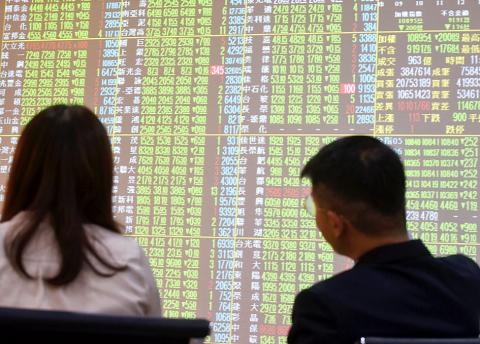The TAIEX yesterday tumbled 1.8 percent to 10,897.12 points, joining a sell-off across regional stock markets after US President Donald Trump threatened to increase tariffs on US$200 billion of Chinese goods on Friday.
The weighted stock index ended 199.18 points lower, its largest one-day loss this year, on turnover of NT$137.863 billion (US$4.46 billion), Taiwan Stock Exchange (TWSE) data showed.
Foreign institutional investors sold a net NT$13.96 billion of local shares, and securities investment companies sold a net NT$559 million, TWSE data showed.

Photo: Fang Pin-chao, Taipei Times
While the setback in Taipei was relatively smaller compared with other major markets in Asia, with Shanghai dropping 5.58 percent and Hong Kong falling 2.93 percent, volatility is expected to continue, analysts said.
Singapore was down 3.1 percent. Japan’s and South Korea’s markets were closed yesterday.
“Trump’s sudden tariff threat has turned investors pessimistic and [they] now think the trade war is likely to continue,” Xincheng International Investment Consultant (信誠環球投顧) analyst Chang Chih-cheng (張志誠) said.
“As it is not very likely that the two countries would resolve the complex core issues and reach an agreement before Friday, market sentiment is forecast to remain turbulent for a while,” Chang said.
The local market might remain under pressure until Friday, as more investors would want to sell their holdings to avoid risks, he said.
“There is a 30 percent chance that the talk between the US and China would break down,” UBS Group AG said in a note.
UBS said that a failure to reach a deal would not only drag the Chinese economy’s growth to below 6 percent, it would also drag down US stocks by more than 10 percent and Chinese stocks by more than 15 percent.
With the Dow Jones Industrial Average forecast to drop in yesterday’s trading, Taiwanese shares, which are highly sensitive to Wall Street’s performance, are expected to fall today, Capital Futures Corp (群益期貨) analyst Yeason Jung (容逸燊) said.
The TAIEX’s fall yesterday was marked by a 2.26 percent fall in the electronics sector, 1.28 drop in the financial sector and 0.86 percent dip in the food sector, TWSE data showed.
Except for smartphone camera lens maker Largan Precision Co (大立光), which advanced 1.5 percent after posting robust revenue growth last month, all Apple Inc suppliers saw their share prices sink, with Taiwan Semiconductor Manufacturing Co (台積電) falling 2.26 percent and Hon Hai Precision Industry Co (鴻海精密) plunging 3.74 percent.
“This might signal that investors had less confidence in Apple amid a potential escalation of the trade war, with the second quarter being a slack season,” Chang said.

Nvidia Corp chief executive officer Jensen Huang (黃仁勳) on Monday introduced the company’s latest supercomputer platform, featuring six new chips made by Taiwan Semiconductor Manufacturing Co (TSMC, 台積電), saying that it is now “in full production.” “If Vera Rubin is going to be in time for this year, it must be in production by now, and so, today I can tell you that Vera Rubin is in full production,” Huang said during his keynote speech at CES in Las Vegas. The rollout of six concurrent chips for Vera Rubin — the company’s next-generation artificial intelligence (AI) computing platform — marks a strategic

REVENUE PERFORMANCE: Cloud and network products, and electronic components saw strong increases, while smart consumer electronics and computing products fell Hon Hai Precision Industry Co (鴻海精密) yesterday posted 26.51 percent quarterly growth in revenue for last quarter to NT$2.6 trillion (US$82.44 billion), the strongest on record for the period and above expectations, but the company forecast a slight revenue dip this quarter due to seasonal factors. On an annual basis, revenue last quarter grew 22.07 percent, the company said. Analysts on average estimated about NT$2.4 trillion increase. Hon Hai, which assembles servers for Nvidia Corp and iPhones for Apple Inc, is expanding its capacity in the US, adding artificial intelligence (AI) server production in Wisconsin and Texas, where it operates established campuses. This

Garment maker Makalot Industrial Co (聚陽) yesterday reported lower-than-expected fourth-quarter revenue of NT$7.93 billion (US$251.44 million), down 9.48 percent from NT$8.76 billion a year earlier. On a quarterly basis, revenue fell 10.83 percent from NT$8.89 billion, company data showed. The figure was also lower than market expectations of NT$8.05 billion, according to data compiled by Yuanta Securities Investment and Consulting Co (元大投顧), which had projected NT$8.22 billion. Makalot’s revenue this quarter would likely increase by a mid-teens percentage as the industry is entering its high season, Yuanta said. Overall, Makalot’s revenue last year totaled NT$34.43 billion, down 3.08 percent from its record NT$35.52

PRECEDENTED TIMES: In news that surely does not shock, AI and tech exports drove a banner for exports last year as Taiwan’s economic growth experienced a flood tide Taiwan’s exports delivered a blockbuster finish to last year with last month’s shipments rising at the second-highest pace on record as demand for artificial intelligence (AI) hardware and advanced computing remained strong, the Ministry of Finance said yesterday. Exports surged 43.4 percent from a year earlier to US$62.48 billion last month, extending growth to 26 consecutive months. Imports climbed 14.9 percent to US$43.04 billion, the second-highest monthly level historically, resulting in a trade surplus of US$19.43 billion — more than double that of the year before. Department of Statistics Director-General Beatrice Tsai (蔡美娜) described the performance as “surprisingly outstanding,” forecasting export growth